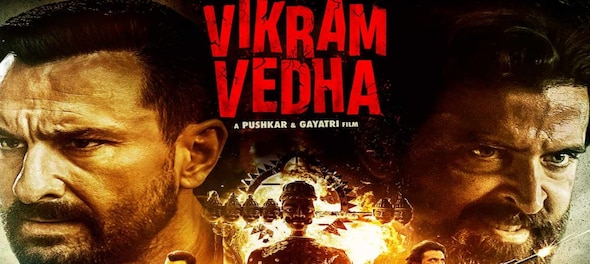
If you thought Siddharth Anand’s 2019 film War was a love letter to Hrithik Roshan, you need to watch Vikram Vedha, Pushkar-Gayathri’s Hindi remake of their own 2017 Tamil blockbuster of the same name. A smart, slick, stylish crime thriller with guns and goons galore, it plays with the traditional cop-criminal construct and transcends beyond, posing existential questions that have no easy answers.
The film borrows its central theme and structure from the Vikram-Betaal folklore. Saif Ali Khan is Vikram, a senior superintendent of police on the hunt for the dreaded local gangster Vedha, played by Roshan in a blisteringly brazen performance. As the encounter specialist who sees only in black and white, right and wrong, Khan is understated, efficient. Though his Vikram is the perfect foil for Roshan’s Vedha — he is the method to his madness — and contributes immensely to the film in a way only an actor of Khan’s experience and versatility can, Vikram is no Sartaj Singh.
Khan’s Sikh cop from Sacred Games continues to be his most haunting, affecting iteration of a police officer who changes irrevocably while solving a high-profile case. However, in Vikram Vedha, Khan bowled me over (once again) with how secure he is as an actor. He lets Roshan have the spotlight and bask in its glory in slow motion, hair blowing, his chiseled body silhouetted against the setting sun, casting a pristine golden halo around him as he reduces people to pulp.
Though his UP (Uttar Pradesh) accent flounders more than once, Roshan is electrifying as Vedha. He brings an unadulterated magnetism, swag, and casualness to all the bloodbath, and makes bad look deliciously good. After Shah Rukh Khan and Shahid Kapoor, Rohan could be the next brilliant bad boy of Bollywood. And of course, he nails the scenes where he needs to be vulnerable. Vedha’s younger brother Shatak (Rohit Saraf) is the center of his world, a lot like Vijay’s baby sister was in Agneepath (2012), another Roshan remake of a celebrated classic. Roshan and writers Pushkar-Gayathri make Vedha a lot more than a rustic goon. They thoughtfully layer both him and Vikram, and more often than not, these layers overlap. So much so, that by the end, it gets difficult to tell them apart. The black and white both merge into a vast, unending grey.
Roshan and Khan ably shoulder the film but Vikram Vedha’s screenplay is its biggest star. It is the kind of film in which even seeming small talk attains significant stature at some point. By the time Vedha finishes narrating Vikram his introductory story under custody and presents him with the first moral dilemma, the stage is set — you know there will be another meeting, another story, and another conscience-probing question. The film’s three-story narrative works like a playground, and boy, do the men play.
The writer-directors leave no loose ends. The writing is clever and the dialogue, by Benazir Ali Fida and Manoj Muntashir, broadly colloquial. Some of the action sequences are beautifully shot, especially the one that features in Vedha’s first story and elevates him from a newbie in the gang to the leader’s right hand. Shot in a field with the setting sun in the backdrop and Kisi Ki Muskurahaton Pe from Raj Kapoor’s Anari (1959) playing in the background, it is a visual treat. Cinematographer PS Vinod wondrously juxtaposes the falling of limbs and cutting of throats with the song’s didactic lyrics as a gorgeous Vedha goes about having a good time. It’s poetic.
However, barring our titular men, most characters, including Shatak, Vikram’s lawyer wife Priya (Radhika Apte), his cop-friend Abbas (Satyadeep Mishra), and Vedha’s long aide Bablu (Sharib Hashmi), are painfully underwritten. Vikram and Priya’s story arc is too undercooked to create any substantial impact. It would have benefitted the film greatly if it were given more blood and meat. The background score too, by Sam CS who also composed for the Tamil original, is a bit overly enthusiastic, but it does staggeringly elevate the film’s manic energy. Then there’s the item song Alcoholia. Though Roshan dances with mad abandon, it is absolutely a needless and distracting digression.
But these are minor lapses. Other than its meditative exploration of the ambiguousness of morality, Vikram Vedha also makes for a fantastic case for two-hero projects. It was an absolute joy to watch titans as resolute as Khan and Roshan bring in their A-game with such brute force. Sacred Games comes to mind again. What would it have been had Nawazuddin Siddiqui or Khan refused to share the pie? It’s a pity that the heroes of the world’s largest movie industry cannot set aside their vanity and insecurities for the love of cinema and bring to screen anomalies such as Vikram Vedha more often.
The Hindi remake is thoroughly enjoyable if you have not watched the original. But even if you have and even if the 2017 Tamil film had R Madhavan and Sethupathi in terrific form, it did not have Hrithik Roshan. And that makes all the difference. Towards the end, Vedha asks Vikram if he’d want to listen to another tale, his love story. Vikram is too exhausted to indulge him. I want to. Can we have a sequel, please?
Vikram Vedha is playing at a theatre near you.
Read other pieces by Sneha Bengani here.
Check out our in-depth Market Coverage, Business News & get real-time Stock Market Updates on CNBC-TV18. Also, Watch our channels CNBC-TV18, CNBC Awaaz and CNBC Bajar Live on-the-go!


Lok Sabha elections 2024: From Wayanad to Shivamogga, key battles in the second phase
Apr 25, 2024 2:01 PM
EC probes allegations of MCC violation by Modi, Rahul; seeks response by April 29
Apr 25, 2024 1:32 PM
LS polls phase 2: Rahul Gandhi, Shashi Tharoor in fray; Hema Malini, Om Birla eyeing hat-trick
Apr 25, 2024 12:19 PM
UP constituencies to witness three-cornered fight in second phase tomorrow
Apr 25, 2024 10:47 AM

